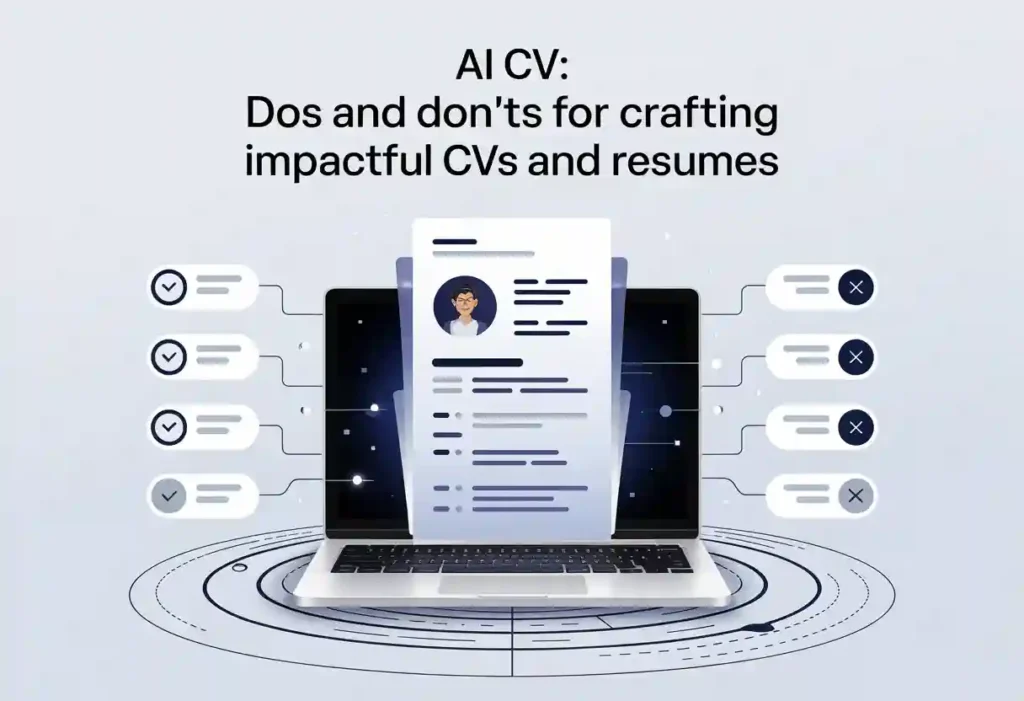Your degree, sadly, isn’t a golden ticket.
Higher education statistics for 2024 data showed that 1,734,805 undergraduates were accepted to start undergraduate courses in the UK.
With more and more people attending university each year, there is more competition for graduate jobs.
And the greater the pressure to distinguish yourself from the thickening herd, a significant proportion of which will have the same academic credentials as yourself.
Millions of graduates enter the workforce each year looking for jobs.
The better you can distinguish yourself from your peers, the more likely you will make yourself more employable.
You can do a few key things to make yourself more employable.
We will cover this in greater depth in the article.
These include:
- Acquiring highly relevant work experience.
- Getting supplementary qualifications and certifications in the field in which you wish to work.
- Creating a valuable professional network.
- Writing a highly effective CV
- Writing a Great Cover Letter.
- Gaining practical interview skills.
How To Be More Employable: Step By Step
Step 1: Establish Goals
Before understanding how to make yourself more employable, it is vital to have a clear goal regarding the job you aim to land once you have graduated.
Dos
- Make your goal specific and achievable (aiming to be CEO of a company straight out of University might not entirely be within the range of possibility).
- Think about what this first job can lead to as you progress into your industry, and what pursuing a career in this area means for your personal life.
Don'ts
- Don't rush this decision unnecessarily. It is much harder to change the further down the line you get. So, take your time to get this right.
- Don't ignore supplemental learning: Bypassing additional certifications or qualifications in your field could leave gaps in your expertise.
Step 2: Create An Action Plan
Put together a detailed road map, working backward from the job description requirements of the role you aim to apply for.
Dos
- Structure your time wisely. Target periods like holidays to tick off parts of your action plan, including taking supplementary certification exams or gaining work experience.
- Always keep your goal in mind when creating your plan.
Don'ts
- Don't get disheartened if your plan doesn't materialize exactly how you thought it might. Stay adaptable and stay positive.
- Don't avoid industry-related work experience or internships, as it could leave you trailing behind candidates who show real-world knowledge.
Step 3: Research Appropriate Training and Qualifications
As part of its acceptance criteria, the role you are applying for may require that you complete a specific training course or have a particular qualification.
For example, to be an accountant, you must pass a minimum of AAT Qualification exams for a firm’s position.
Dos
- Thoroughly investigate the required training or qualifications to apply to your chosen job effectively. You can start by asking tutors and people in the industry what employers will look for on your CV.
- Start as early as possible, ensuring that you have most, if not all, the certifications you need by the time you apply.
Don'ts
- Don't waste time on courses irrelevant to the industry you choose to go into. Although extracurriculars can often build transferable skills, try to keep them in the general vicinity of the area you wish to go into. There isn't any point in doing a time-expensive drama course when you want to be a lawyer—money flushed down the toilet.
Step 4: Start Developing a Professional Network
Having a solid bank of contacts that you can depend on and who work in your industry can be beneficial in finding job opportunities.
Building this network can start as early as your first year of university.
Dos
- Sign up for networking events and attend them with a positive mindset.
- Ask your tutors who they know who could turn into a helpful contact for you.
- Make sure to keep these contacts warm by reaching out to them as often as possible.
Don'ts
- Don't feel that you need to wait until you have a job in the industry to start connecting with people dedicated to your work area.
- Don't neglect building a professional network; it may hinder your access to industry insights and job leads.
Tips
Finding new contacts can be daunting, especially when starting your job-seeking process.
When sending emails to potential contacts, remember to accentuate your enthusiasm and desire to learn from them.
Remain open to any opportunities that they may offer you.
Step 5: Add Value to These Relationships
Once you have established a few key contacts, you’ll want to ensure you can get the most out of them.
You can do this by asking for their help, meeting with them physically to discuss an issue, or doing some work for them.
All these activities strengthen your relationship and increase the odds that that person will help you get a job in the future.
Dos
- Reinforce your connection by adding value to their relationship with you by helping them out in any professional way you can.
- Explore connections with an open mind. Thinking you can't get anything from someone before you even try could lead to many missed opportunities.
Don'ts
- Don't waste your time on contacts that do not reciprocate. If all they do is take, take, and take, they are not worth your time. Move on.
- Don't be generic: Sending identical resumes and cover letters to every potential employer can reduce your chances of standing out.
Step 6: Acquire Practical Work Experience
Once these skills are in place, seeking work experience in your chosen industry is critical before applying for jobs.
You can look to apply for internships, work placements, or shadowing opportunities.
This will show employers you have real-world experience in the role you wish to enter.
Dos
- Please go into the placement to understand what you want to have learned after completing it. For example, "I want to have worked with this piece of equipment" or "I want to have completed this type of task."
- Think carefully about which placement you want to take. Not all placements are as valuable as others. Talk to people who have completed your desired post and assess how useful it is for your goals.
Don'ts
- Don't switch off once you have acquired a place. Next, think about what you can do to prepare for the placement.
- Never assume that the organization knows you are coming. Make a few calls to confirm the start date and let them know you are on your way.
- Don't be unprepared for placement: Failing to prepare for internships or work placements can result in a less impactful experience.
Tips
When applying for work experience, do not send a generic email and cover letter to each company.
Instead, write specific and considerate applications that appeal to each business, showing your enthusiasm for their organization’s work.
These should highlight how valuable working for them would be for you and what you can offer them in return.
Step 7: Apply For Jobs
Once you are confident in your degree, the skills you have learned, the experience you have gained, and the qualifications you have attained, start the job application process.
At this point, writing a good cover letter and CV is key to success in the application process, something CVJury can help you do better than anyone else.
Dos
- Learn how to write an achievement-based CV that points to your quantifiable wins, fundamental skills, and qualities specific to the role you are applying for.
- Optimise your LinkedIn profile. Optimizing your LinkedIn profile can help show a wider group of potential employers that you are an asset ready to work. LinkedIn has proven to be an asset for job seekers who position themselves as winners.
- Practice interview skills.
Don'ts
- Don't forget about your connections. Someone you know might know someone who works for the company for which you are applying. Or better yet, use your connections to find opportunities to apply for.
- Neglect good interview etiquette. Nothing will turn your potential employer off faster than dressing inappropriately, being rude, or seeming uninterested. You are there to make a positive impression.
Tips
Before your interview, research the company you are applying to and know the goals and values you wish to join.
It will help ensure you present them with someone who can add value to their organization.
Key Points to Remember When Thinking About How to Be More Employable
- Getting a good degree is only half the equation. You can do much more to make yourself appealing to potential employers.
- Acquiring relevant and valuable work experience is one of the keys to separating yourself from your peers.
- Creating a network of helpful contacts can help you learn more about the industry you intend to enter. It can help with employment opportunities when you start applying for jobs.
- Writing a tailored CV and Cover Letter for each job or placement is much more likely to make recruiters notice you better than a generic one.
- Make sure to work on your interview skills as though they are as important as the qualifications you have attained. You can do this with a tutor or with a friend. This will stand you in good stead for the real thing.
Ready to be More Employable?
If you still feel that some of the points here require more clarification,
In that case, we have a whole range of content that provides information on every part of the job-seeking process, from successful job-hunting strategies to how to answer interview questions.
With the CVJury team’s help, you can feel confident that you are as prepared as possible when you walk through that interview office door. Learn how to write a resume like a professional resume writer would.
Keep Reading: How to be More Employable
How To Become More Employable Straight Out Of University (Part 1 of 3)
Prepare to be an exceptional candidate for a job
Career Wisdom from Harvard's 'Learning & Development'



